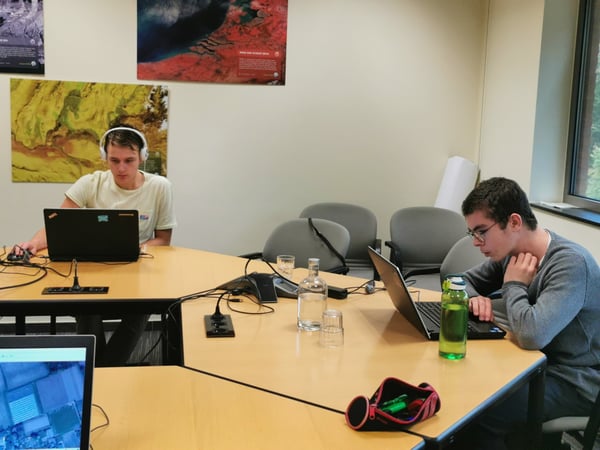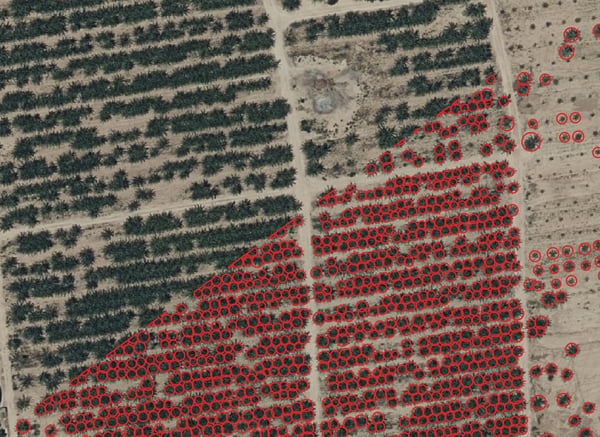Special talents for specific tasks
Processing aerial images is one of our expertises. We process massive amounts of data, from which we retrieve valuable and objective information that is presented in end user platforms. We are constantly developing new processing chains and algorithms to extract more information form the data.
In this context we also came in contact with Passwerk to see if they could support us in in testing and developing software for major clients. Passwerk is a Belgian company with a social dimension which employs over 120 people with autism spectrum disorders who would otherwise find it difficult to get or retain a normal job.
Our Passwerkers are able to think and act at Bachelor or Masters level. By supporting them, we ensure that they can be used for software testing and other quality control assignments, including for VITO.
Dirk Rombaut - Commercial Director, Passwerk
Within our Remote Sensing unit we have plenty of internal assignments that are ideal for someone on the autism spectrum. These are mainly highly routine and repetitive tasks that are required to train algorithms like artificial neural networks. We use these algorithms for example in precision agriculture, to automatically detect and count specific objects on aerial or drone images. These algorithms have to be adequately trained with annotated sample data before you can use them on new images.
Training the detection algorithms properly usually requires a lot of training images, while manually annotating objects in the training images is a very repetitive task that requires continued concentration. It’s a visual-analytical task that some young people with autism seem to be very well suited to.
De Lift
Two years ago we also came in contact with De Lift in Diest via Passwerk. De Lift is a unique school that specializes in young people on the autism spectrum and focuses on teaching and optimizing IT skills. We quickly realized straight away that we could play a part in integrating young people with autism into a daily working environment – and thus into society as well.
At the request of the school for autism, four students who were selected based on strong visual profiles were offered a placement in our Geomatics team. After initial introductions and testing, they officially started in September 2018 and came to Mol every Tuesday, along with their supervisor, to work here together with us. We’re pleased we could extend this collaboration.
Until today, three students still join us every Tuesday morning. Initially, we had to work out how we could offer tailored placements. For example we found that a morning and an afternoon was too intense, so the students currently work from 10 a.m. to noon. If the assignment and the student’s schedule allow it, they even carry on working on their assignments at the school as well.

Students from De Lift Education join our Geomatics group every Tuesday
Tailored placements
In our collaboration with De Lift it’s of course extremely important that the content of each placement is also tailored to each individual student. Right from the start, the intention was to involve them in identification tasks, like manually marking specific objects on aerial images. One of their assignments is identifying palm trees on blurred aerial photos, for example, which is far from easy. Another task is annotating blossoms and fruits in images from apple and pear tree orchards. We also noticed that one particular student was very interested in programming. The beautiful thing is we can tailor specific assignments and make it possible for a student with a specific interest to work on something they can execute first-class. At the same time, the students learn to work with GIS software, and they learn how to function in a corporate environment.
 Identification of palm trees on aerial photos
Identification of palm trees on aerial photos
Support to establish an INDEPENDENT future
VITO is of course not the only company that offers placements to De Lift. Their students have placements at a range of IT companies, from SMEs to major players. De Lift is constantly looking for appropriate placements and projects for each and every student, to allow them to develop their skills further in a work environment. Luckily the IT sector is well aware of the potential offered by people on the autism spectrum. Cronos, the largest IT company in Belgium, also supports the school financial support.
As a school for collective home education, we grew from a private initiative, so we don't receive any subsidies and are completely dependent on registration fees and sponsorship. It’s fantastic to receive support, financially and operationally, and see how our students are hereby able to discover their capabilities and establish an outlook to an independent future.
Annemie Willekens - Coordinator De Lift Education
The school was established more than five years ago and has 16 students this academic year. Students come from across Flanders and all have an individual class schedule. Various ex-students have graduated and found jobs in the IT sector. Our concept is unique and offers a future to young people who would otherwise not get the support they need to ultimately be able to find a suitable job.
------------------------------
For more information about De Lift Education you can visit www.delifteducation.be or read their latest annual report 2018-2019.



/Blog_CORSA_1200x650.png)
/Blog_WorldCereal_1200x650.png)
/lewis-latham-0huRqQjz81A-unsplash.jpg)